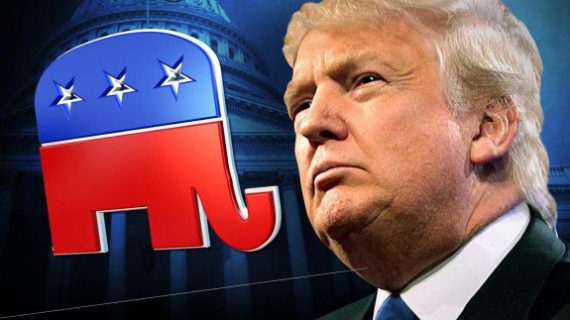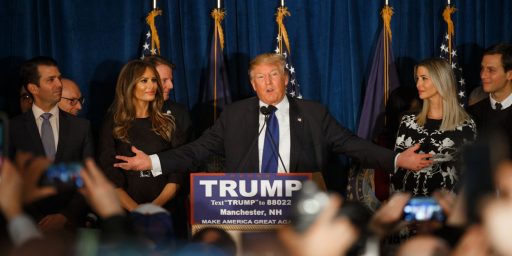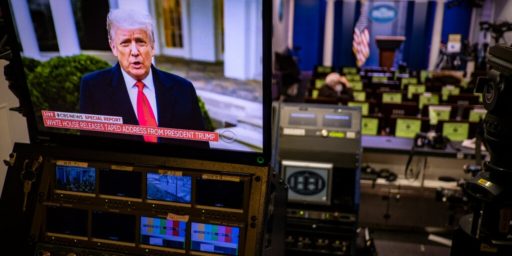Trump, Electoral Fraud Lies, and the Primaries
Our system and the shaping of the GOP's future.

A piece from NBC News (Laser-focused on 2020, Trump seeks a Michigan Legislature that could help him in 2024) underscore the way in which an influential politician (especially the nominal head of a party) can influence the evolution of that party via primary elections.
It’s unusual for a former president to endorse in races so deep down the ballot, especially nearly nine months before the Republican primary. But Trump has backed seven candidates for state House or Senate seats in Michigan, an electoral battleground that he lost narrowly to Joe Biden last year — more than anywhere else. Most of the endorsements, including Rocha’s, were announced in recent weeks. All of the candidates have one thing in common: They’ve made election administration and investigating last year’s vote central to their platforms.
Trump’s focus on the state illuminates just how driven he is to exact revenge on those who haven’t supported his baseless claim that the last election was stolen from him. It’s also a play to install allies who could be helpful should he run for president again in 2024 and find himself locked in another close race. The Republican-controlled Legislature spent eight months investigating the results of the 2020 presidential election and found no reason to doubt their legitimacy. GOP leaders have also refused to accede to Trump’s demands for a ballot review like the one Republicans authorized in Arizona, which found no proof of fraud and concluded that Biden defeated Trump in the state by even more votes than the certified tally showed.
As a reminder, the United States uses what amounts to a two-step process to elect office-holders. There is first a nominating primary for each of the two parties. These are low-turnout affairs (at times, very low, as in single-digits) especially in off-year, i.e., non-presidential elections. They take place months before the November general election (sometimes as early as March). Depending on the state it may only take a plurality of the vote at that stage to nominate a candidate, which gives that candidate access to the general election ballot.
Note that if the district is, for whatever reason, non-competitive (i.e., skewed heavily in one partisan direction or the other), then winning the primary of the party with the advantage in the district is tantamount to winning the seat.
So, by way of example, let’s say I am running for the State Senate in a heavily Democratic district (it voted 65-35 for Biden in 2022). Let’s say I win the nominating primary with a turnout of 15%. From there I barely campaign and go on to win the seat 60-40.
Given those parameters, which are not unusual, it is not hard to see how a given party can be heavily influenced in its overall development by the preferences of a relatively small number of voters.
Let’s take an example from the NBC piece: Rachel Smit, candidate for the GOP nomination in the Michigan House of Representatives for the 80th district. Recent voting patterns in that district suggest an R to D ratio of 65-35. In other words, it is like my hypothetical (which I made up before checking this race): a seat that will go to whomever the R candidate is, save under the most extraordinary of circumstances.
The district has over 93,000 residents. In 2020, roughly 51,000 votes were cast in the election for this seat. The winner was Republican Mary Whiteford with almost 35,000 votes. She won her nomination with just over 11,000 votes in the primary. I would argue that the 11,000 votes were the ones that won her the election, given the partisan makeup of the district.
One presumes that if Whiteford runs, her incumbency advantage will help her in renomination, although she may find herself either having the defend why she didn’t help Trump’s attempt to steal the election in 2020 or find herself saying trumpist things to win re-election. It is certainly not outside the realm of possibility that in a low turnout context that Trump’s endorsement could have an outsized amount of influence.
Regardless of outcomes, it is profoundly disturbing to have a strain of one of the major parties be pushing electoral fraud lies and be part of a clear strategy to position elected officials so that they could help steal an election in the future.
I want to underscore the systemic issue here: a small number of voters, in a relative sense, can very much reshape in important ways the legislative delegations of parties. This can have long-term effects because once elected, incumbents tend to remain in office and matriculate up through the ranks. In other words, today’s state legislators are tomorrow’s members of congress. This is no small issue given the themes under discussion. Further, winners beget copycats. If candidate X wins by parroting Trump’s lies, candidates Y and Z will notice and follow suit because they want to win.
And, again, this reshaping is possible because we nominate candidates via primaries, and those candidates usually run in non-competitive districts.
All of this intersects with a broader point I have been making about our parties: that the party-in-government (i.e., politicians in office identifying with a certain label) are not selected because they conform to a party platform or philosophy. There is no test to become a member. Rather, since entry into the party is via primaries, a given candidate does not have to conform to any previous set of ideals but can bring new ideas into the party and change it as a result.
The party does not choose its views, and then its candidates (as is typical elsewhere). Rather, two (or more) primary candidates can represent very different views and the winner’s views become the party’s views. And those primary elections are driven by a small subset of the broader partisan public.
Back to the NBC piece:
A number of claims that had circulated about the vote were debunked in the McBroom report, outraging Trump, who issued multiple statements.
The report, supported by every Republican on the state Senate Oversight Committee, was the product of an eight-month inquiry, and it concluded that there was no basis or evidence to support the Trump campaign’s repeated claims that the election results failed to reflect the will of the voters.
Mike Detmer, a state Senate candidate backed by Trump, is challenging incumbent Lana Theis, who signed off on the report. Detmer said he believes that if the Trump-backed candidates win seats next fall, “we’re going to at least have a coalition of people that are working for the same goal.”
The report is relevant because it was supported by Republicans on the committee. It suggests that the institutional orientation of the party-in-government at the time was to support empirical evidence. The way to fix that, from a trumpist POV, is to nominate candidates who will be willing to ignore such evidence once in office.
It other words: change the party via primaries.
Detmer is a gem, by the way:
Detmer, who fell short in a U.S. House primary last year, made local headlines then for defending the neo-fascist Proud Boys on Facebook and separately suggesting on Twitter that people should face “firing squads” if they are deemed to have engaged in “fixing” or “election fraud.”
Speaking of gems, a number of Michigan candidates were present in DC on 1/6. For example, the NBC article starts with a discussion of John Rocha, who was going to run for the GOP nomination to run for Congress against Fred Upton, who was one of the Republicans who voted to impeach Trump after the events of 1/6.
Via Bridge Michigan: They were at the Capitol riot. Now, these Michigan Republicans want your vote.
Persuading Republicans who do not trust elections to vote is a challenge, acknowledged Rocha of Kalamazoo, who works in manufacturing. He is running to unseat U.S. Rep. Fred Upton, one of 10 congressional Republicans who voted to impeach Trump for inciting the Capitol riots.
“People don’t trust the system, period, but it’s our job to reassure them that we’re going to fight the system,” Rocha told Bridge Michigan, noting people have told him they won’t vote because they’re not sure “if it’s going to be stolen again.”
[…]
Rocha, the congressional candidate from Kalamazoo, was with Rigas. He told Bridge Michigan he was too far away from the Capitol to understand what was happening inside. They had watched Trump speak nearby and then walked over with what he called a peaceful crowd before leaving around 3:30 p.m.
Other Michiganders running for GOP nominations did, in fact, participate in the insurrection:
Ryan Kelley climbed on scaffolding, helped a man moving a police barricade and repeatedly waved fellow protesters toward the Capitol riots in Washington, D.C., on Jan. 6.
Now, he’s running for governor of Michigan.
Kelley’s ally in organizing rallies against pandemic orders in Michigan, Jason Howland, was there that day too, just feet away from a clash between protesters and police. He made it inside the Capitol with hundreds of others, many of whom now face criminal charges.
Howland is now running for state House.
Others present at the pre-insurrection rally in addition to Rocha: congressional candidate Audra Johnson and state House candidate Angela Rigas.
None of those were mentioned in the NBC piece.
It is more than disturbing to see potential candidates who actively participated in the insurrection–but if such candidates do make it to the general election ballot, it will be because we use primaries to nominate our candidates. In other democracies, these types of candidates would have to form their own party or the GOP as an organization would have to publicly embrace them, instead of being able to passively accept them as part of the process.
It is no small thing to note that the more bombastic candidates are the ones more likely to find themselves on FNC, Newsmax, OAN, and talk radio. And the question then becomes: what is the media diet of primary voters? When one considers that primary voters tend to be older and more ideological, the answer is not hard to guess (and certainly a topic that needs further study to confirm).






It is increasingly likely that some state legislature will try to overrule the voters and impose their preferred outcome. This would quickly end up before the supremes and 4 justices have already expressed interest in examining the role of state legislatures in choosing electors. My estimation is those four will side with the state legislative action against the voters, the liberals and Roberts, will argue for the voters, leaving it up to Barrett. Since she wasn’t part of the PA case that was reviewed, we don’t know her opinion.
I’m not hopeful.
It appears that we’re looking at the situation of our system being only as good at the most venal, ignorant, and corrupt 10 or so percent of the electorate is 🙁 . Good time to be old.
We’ve had primaries for about 50-60 years and they were working fine, give or take. Crazy people would be rejected in the primaries far more often than not.
Still mostly functions on the Dem side — we might nominate someone too far to the left and they get trounced, but it’s never the “we need to burn down the entire system!” left.
Something changed on the right that caused primary voters to embrace performative assholery and vice signaling. To view being a loud idiot who shouts as strength, even if they are shouting about lizard people and pedophiles and nonsense.
How the hell did that happen? I mean, there have always been a few, but how did that become dominant?
@Gustopher:
Hey, they think Trump is one of them. The blue-collar billionaire, as they call him. Being a loud-mouthed, abysmally ignorant and incurious churl has become a sign of authenticity.
Everybody else is a Commie faggot. Trump’s a real man.
@Gustopher: Well, how do you think that the Moral Majority types gained power in the GOP back in the late 70s/80s?
Or, to go further back and to even a more problematic example, how do you think the one-party South worked in the Jim Crow era?
There was the Tea Party about a decade ago.
The past is less idyllic than one might think.
Also: a lot of this is linked to what I have written about in the post-1994 realignment.
@Gustopher:
Short answer, they lost the culture wars, and economic dominance pretty much overnight. Men panicked over their shrinking dicks. Both sexes panicked because there might be a third sex. Whites panicked because apparently it’s not OK to murder Black people (some of the time) and why the hell did they stockpile whole arsenals if not fer shootin’ uppity ni–ers? The not-smart feel left behind, ignored and belittled by the smart. Christianity is waning. And all the while Facebook has installed a fire hose in people’s brains and are flooding those brains with bullshit.
And then, because they were such lunatics, they started losing Big Bidness. Tech thinks of those people as Morlocks. Service industries did a wallet biopsy of America and said, yep, turns out we do think Black lives matter. A lot has gone wrong for those people. A lot. Taken collectively they are on the skids.
They still have potent weapons: fear beats shit out of indifference. Unity beats shit out of division. And one other thing: for the supposedly smart, educated side of the bell curve we suck balls at communicating with those people. What are we offering them? Scorn. That’s our offer: scorn. And, if you apologize for your ancestors we’ll also give you a link to an online sensitivity course you can take, in between balancing your two jobs and three kids.
What’s funny is I’ve always been a sneering, condescending prick to those people, but we weren’t all supposed to do that. There’s supposed to be some wiser heads, some people less in love with the sound of their own cutting wit. Where are the kumbaya kids? Where’s the hope?
Those people didn’t dig this chasm all on their own. When you stiff-arm people and insult people, sometimes they don’t like it.
“Being able to” suggests this, but let’s be really clear. Even in our democracy, passive acceptance of these radical candidates is still a choice for whatever passes as party leadership. I state that completely understanding the incentives and the political requirement to hold power in order to create policy and seat the judiciary.
But, I believe it inappropriate to even suggest the primary process exculpates the major party that is behaving so cowardly right now. Country over party (more specifically the democracy that is this country’s defining attribute over electoral chicanery) is a thing or least it used to be. There are some number of Republicans with war chests and incumbency who could stand with Kinzinger and Cheney over Trump. There are sufficient moderate (or even reality based) Republicans-in-government today to meaningfully and publically turn against their Gosars and Gohmerts and Boeberts and Taylor Greenes. Yes, standing up against The Big Lie, insurrection, and the other extremisms of today’s GOP could likely lead to electoral losses. Yes, it could mean power being held by the opposition for a while longer than desired. But, there are choices being made.
We’ve established that politicians are whores. Now, we are merely haggling about the price.
@Scott F.:
To be clear: I do not think it does, nor have I argued it does.
But that still doesn’t undercut the fact that there is no central actor to directly blame, more importantly, to hold accountable. That’s part of the problem. And it is made worse by the inability of our system to offer more than one real choice at the ballot box.
It is hard not to be depressed about the future of the country when you read this. One of the biggest problems the Democrats have is that they will do things that hurt them politically because it is the right thing to do. A good example was the de-listing of FARC as a terrorist group, which was the subject of a Dr. Taylor piece a few days ago. It is good policy that will hurt the Democrats (marginally perhaps). The Republicans have no such worries because they have no policy except to oppose Democrats and seek power. Americans do not vote for smart policy choices, especially if it involves the long game.
@Steven L. Taylor:
I’m certain you don’t think the primaries excuse bad behavior and I didn’t mean to suggest otherwise. My apologies.
Yet, while I agree there is no central actor to blame or even a center of power from which to command the party brand, I earnestly believe there are a multitude of spineless GOP politicians who know the danger the country faces and they should be held to account for turning a blind eye at best or feeding the beast themselves at worst. The Never Trumpers know them all by name.
And while I grant that what I expect them to do for the sake of our democracy is almost certainly political suicide for themselves and therefore it is completely understandable that they won’t do it, that still doesn’t make them blameless for the state the country finds itself in.
@Steven L. Taylor:
Tea Party is where we started seeing the truly unhinged winning primaries. Your Sharon Angles and Christine O’Donnells and the legitimate rape dude…
Before that, sure the Republicans nominated racists and godbotherers, but they were sane racists and godbotherers. These days I think David Duke would be called woke by half the primary electorate. It’s like they were listening to a LaRouchie go on about how Queen Elizabeth not only controls the international drug trade but also can unhinge her jaw when eating babies, and then said “yes, we want that!”
It almost makes me want to put a schizophrenic homeless man in a suit, and run him as a Republican. Sure, he was an alcoholic and drug abuser, but that was before he realized that one of the voices in his head was God. It’s a tale of redemption — voters will love that, they love that the pillow guy was a coke addict.
This is not completely correct about countries with a Westminister parliamentarian system. In Australia, for example, it’s common for party members in the local electorate to “preselect” their candidate. This usually involves an appointed committee interviewing aspiring candidates and voting to decide who will be successful.
The system has had some spectacular foulups, most notably the preselection of Pauline Hanson as a Liberal (i.e. conservative) Party candidate for the federal House of Reps in 1996. Weeks before the election, it was revealed that she had a history of racist and other extremist statements. The party disendorsed her, but it was too late to change the ballot papers showing her as a Liberal, so she won anyway. She’s been a constant thorn in the side of the party ever since, running ‘Pauline Hanson’s One Nation Party’.
Both the major parties have changed their rules from time to time to give full-time officials/national office-bearers discretionary control over candidate selection, but local committees take strong exception to losing their independence. It’s a fluid situation, but it would be wrong to think members at electorate level have no say.
@Gustopher
“How the hell did that happen? I mean, there have always been a few, but how did that become dominant?”
Fox News.
I meant to add: over the years, both major parties have tried occasionally to “parachute” a celebrity candidate into a House seat or a state Senate ticket. These attempts have sometimes caused a furious backlash from locals, especially in the smaller states, who resent Canberra telling them who their representatives should be.
Might be a lesson to learn from Virginia where they had a convention with ranked-choice voting, rejected the crazy candidates and went with a fairly conventional one in Youngkin.
@Gustopher:
Was. Right.
@Ken_L: Thanks for that input–and you are right, one has to be careful about sweeping statements.
Still, what you describe is substantially different from what is basically a self-selection process in the US (at least to run in a primary). The US system is definitely the most permissive party system when it comes to candidate selection, especially when one considers how easy (in a relative sense) it is to go from a nobody to a major party candidate.
@Gustopher:
I think it is easy for the past to seem better than it was. But, again, pre-1994 the vast Dem majorities made it easier to hide the crazies of all ideological stripes.
Beyond that, it is funny you should mention David Duke–he was a Republican member of the LA legislature in the late 80s/early 90s and the LA GOP nominee for governor in 1992.
@Scott F.:
No worries–I just wanted to clarify.
I don’t disagree about multiple individuals who have behaved irresponsibly.
I just want to stress the lack of a central actor, because it is really important, and yet as a country, we mostly don’t understand that reality/ignore it. We talk like there is a central GOP (and Dem) authority when there isn’t.
What makes all of this so difficult is that it is a massive collective action problem (with the 2016 GOP presidential primaries being a really stark example).
And, to be clear: the spinelessness and fecklessness of many GOP politicians made Trump’s victory possible, and many of those same folks are letting things like lies about the election and 1/6 to fester.
What is especially frustrating is that the main tool to combat these kinds of issues should be elections, but our elections are so uncompetitive (if not skewed towards the minority in the EC and Senate) that a corrective via the ballot box is nearly impossible. The only way to derail the collective interests of the GOP to win is for them to lose and the rules make it too easy for them to win.
@Gustopher: @Steven L. Taylor: To be clear, I am not saying things are bad now. Indeed, I think it is worse for a variety of reasons in a variety of ways.
Again the 1994 election and the re-sorting of the parties were major and set us on a pathway to the problems of separation of powers systems to come to the fore (a la the work of Juan Linz).